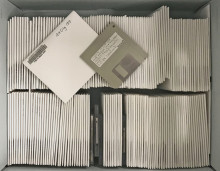Juli McLoone
Library Blogs
Showing 1021 - 1030 of 1996 items

Join Nicola's Books and the Ann Arbor District Library for a conversation between author Kathleen Flynn and U-M Residential College Creative Writing Director Laura Thomas on Wednesday, March 7, 2018 from 7:00-8:30pm in the Downtown Library's Multi-Purpose Room. Flynn and Thomas will discuss Flynn's debut novel, The Jane Austen Project, in which two researchers from the future are sent back in time to meet Jane and recover a suspected unpublished novel.

The Digital Content & Collections department begins an ambitious audit/assessment of our 280+ digital collections. This is the second in a blog series about the endeavor, noting how we started with a pilot group of collections to assess and the lessons learned.

An outline of the workflow developed to image and preserve content from obsolete floppy disks. Part 2 of 2.

Perch’s mission is to make research more accessible to undergraduates.
UROP, the Undergraduate Research Opportunity Program, does a great job at its mission: helping underrepresented and first-generation students gain their first research experience and make the most of it. When UROP started 25 years ago, it was able to accommodate every eligible student who applied.That’s no longer true. The number of undergraduates seeking research experience has grown tremendously in the last decade. Why?
For many students, undergraduate research is their first experience working on real-world problems that may provide widespread impact and help people in the future. Through research, students gain valuable critical thinking skills, a new way of asking questions. Research is a chance for students to apply what they’ve learned in class to the real world, to venture boldly beyond the maps of the known. Research is a chance to improve people’s lives, it’s the chance to get a law of nature named after you, it’s the universe trying to understand itself. Not to mention that undergraduate research experience is now necessary rather than an added bonus when applying to graduate school, industrial R&D jobs, and numerous other career paths.
UROP, the Undergraduate Research Opportunity Program, does a great job at its mission: helping underrepresented and first-generation students gain their first research experience and make the most of it. When UROP started 25 years ago, it was able to accommodate every eligible student who applied.That’s no longer true. The number of undergraduates seeking research experience has grown tremendously in the last decade. Why?
For many students, undergraduate research is their first experience working on real-world problems that may provide widespread impact and help people in the future. Through research, students gain valuable critical thinking skills, a new way of asking questions. Research is a chance for students to apply what they’ve learned in class to the real world, to venture boldly beyond the maps of the known. Research is a chance to improve people’s lives, it’s the chance to get a law of nature named after you, it’s the universe trying to understand itself. Not to mention that undergraduate research experience is now necessary rather than an added bonus when applying to graduate school, industrial R&D jobs, and numerous other career paths.
•
Jeff Witt details the recent launch of the Inclusive Intercultural Skills Series (IISS) by the Library Diversity Council's (LDC) subcommittee on learning curriculum and event planning.

Two time travelers from a future world arrive in 1815 to retrieve a lost manuscript and letters by Jane Austen. They are forbidden to change the past, but as they come to know Austen and her family, they decide to try to save her life. Whether they succeed or not, I will not say, but this is a suspenseful and thought-provoking novel, an intriguing combination of science fiction and Jane Austen spin-off.
•
In the Computer & Video Game Archive, 2017 proved to be a popular year for game genres across the board, including sports, first-person shooters, fighting games and racing games. As a comparison, 2018 is so far proving to be the year of the Nintendo Switch, as well as a game called Fortnite, which is quickly climbing the ranks amongst the most popular games of the year in the archive. The question is, will it become popular enough to beat out FIFA, the game series that has topped out our lists for the past several years?

Charles Chang is the next guest speaker in our Deep Dive into Digital and Data Methods for Chinese Studies series. He will introduce a computational method that overcomes the barriers of absent official urban statistics in studying modern China. He will also offer a workshop on geocoding Chinese addresses.

A week or so ago, I went to pick up a book from Hatcher when my attention was captured by a Bikini Kill poster. It was part of an exhibit in the Hatcher North Lobby on feminist zines. As I wandered through the display of drawings, poems, rants, cartoons, and collages, I was struck by the unique power that zines have to speak directly to the heart. Even though these zines were made and distributed decades ago, I still found myself nodding in agreement with the insights and raw emotions found in their pages.

Welcome to PIPEline! Through this platform, we will share with the library community how our work intersects with these themes and how they have both shaped not only the work itself, but also the way we as professionals, view and engage with our work. Meet our primary contributors and get ready to follow our adventures (and possibly misadventures) along the way!